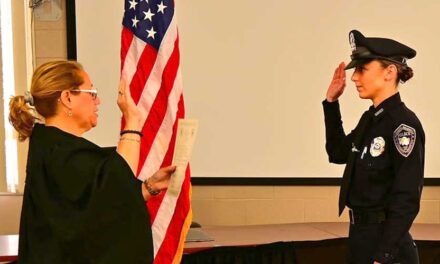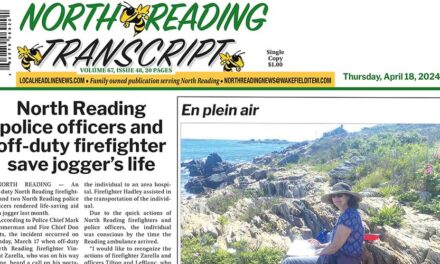FY2020 budget hearings underway
Published March 7, 2019
By MAUREEN DOHERTY
NORTH READING — The extensive process of reviewing each departmental request that comprises the “town” side of the Fiscal Year 2020 budget began early Saturday morning at a joint meeting of the Select Board and Finance Committee with the heads of the Police, Fire and Public Works departments that lasted for five hours.
Each department presented its accomplishments in the past year and its goals and objectives for the coming year, detailing departmental needs in staffing and capital expenditures to deliver the services to the townspeople that each department believes to be essential.
On Monday night, both boards met jointly again to hear the departmental requests of the Community Planning Commission, Youth Services, Code Enforcement/Building Commissioner, Board of Health and Public Safety Administration.
Subsequent meetings on March 18 and April 1 will be devoted to the budget requests of all other remaining town departments and will enable the FinCom, the Select Board, and the Town Administrator and Finance Director to formulate their recommendations with respect to each budget request and to reconcile how the town will either pay for it or prioritize expenditures in areas where a department has an identified need which the town cannot afford to fund.
A different approach
Town Administrator Michael Gilleberto wanted to take a different approach to the budgeting process this year that enabled the department heads to think more expansively about their true needs and the many unmet needs that have gone unfunded in delivering services to the community, such as road repairs or investments that reflect the town’s changing (and aging) demographics.
In taking this approach he has also opted to hold off on his recommendations to the Select Board at this stage in the process.
“April 1 will be the last hearing for the departmental requests and April 22 will be the evening I am expecting we will formulate a recommendation as to what the final budget for the municipal non-school departments would look like,” Gilleberto told the Transcript.
Assuming the Select Board’s recommendations are completed on April 22, Gilleberto believes the budget may be ready for formal approval by the board on Monday, May 6, which would be the last meeting for both Chairman Michael Prisco and board member Bob Mauceri as they have announced their intention not to seek re-election in the May 7 town election.
Mauceri expressed his desire to have all the budgets vetted and ready to hand off to their successors before he and Prisco depart.
“I’m expecting we will have a budget hearing where the public can come and learn about the budget that evening, May 6,” Gilleberto said, adding, “We usually do the budget meeting two meetings before the June Town Meeting. For the meeting right before the June Town Meeting, we do the warrant article hearings.”
As of Monday night there were potentially 21 warrant articles for June Town Meeting, 19 of which were routine. A possible 20th article would be the establishment of a Special Education Reserve Fund that would enable the town to be better prepared for unexpected expenditures and the 21st would be a local ban on single use plastic film bags.
A few months ago the board directed the T.A. to look into the ways other area communities have handled this initiative and present a draft proposal for a ban to be considered by Town Meeting voters.
The last day to submit warrant articles is March 18 so this list could be expanded.
New revenue plan format
Concurrently with the hundreds of pages of budget data to digest in advance of the June 10 Town Meeting, the town has also rolled out a new revenue plan based on many months of discussions with the Financial Planning Team, according to Finance Director Liz Rourke.
This new format for FY20 “will allocate specific fixed costs to school and municipal operations each year,” Rourke explained to the board Monday. “The previous format did not directly allocate fixed costs to the school or municipal operations; fixed costs came directly off the top of available revenue (and) the remaining revenue was divided 66% to schools, 34% to town.”
The new revenue plan “uses available revenue less combined fixed costs to get the amount of revenue to be split, then directly offsets each budget with fixed costs and revenue sources,” she said.
In the example used Monday night, Rourke stated that the under the current FY19 budget the town’s total general fund revenue was $65,699,339 with fixed costs of $10,183,998 leaving available funds of $55,515,241.
In the FY20 budget, the town’s total general fund revenue will be $67,839,715 with fixed costs of $10,358,939 leaving available funds of $57,480,776.
Under the revenue split in FY19, the town was allocated $18,709,191 with total fixed costs of $4,892,326 (for insurance, workers’ comp., etc.) and had receipts of $2,202,898 (from trash fees and various transfers, such as ambulance reserve) leaving $16,019,763 for total town salary and expenses.
In the proposed FY20 budgets, those allocations and expenses break down as follows: the town would be allocated $19,448,621 with total anticipated fixed costs of $5,245,255 (for insurance, workers’ comp., etc.) and would have receipts of $2,214,449 (from trash fees and various transfers such as ambulance reserve) leaving $16,417,815 for total town salary and expenses.
Under the school budget for FY19, the total school allocation was $36,640,059 minus total fixed costs of $6,059,808 (for retirement, workers’ comp, various insurance) leaving a total school salary and expenses budget of $30,580,251.
In the anticipated FY20 school budget, the total school allocation would be $38,032,156 minus total fixed costs of $6,496,055 (for retirement, workers’ comp, various insurance) leaving a total school salary and expenses budget of $31,536,101.
Rourke’s report also identified the town’s major fixed costs of an anticipated 7.5% increase budgeted for health insurance in FY20 compared to FY19; a 7.74% increase in county retirement costs, a 4% increase in Medicare costs and a 3% increase in workers’ compensation insurance.
Prisco advised that the town will need to be proactive with regard to the county retirement increase before it spirals out of control in the coming years.
The bottom line
The bottom line is that the town has $16,417,815 available for municipal operations in FY20 and currently has municipal departmental budget requests totaling $17,428,302 or a deficit of $1,010,487 to reconcile prior to June 10.
In subsequent editions the Transcript will review the various departmental budget requests in detail in advance of the public hearing anticipated on the total budget on May 6.




